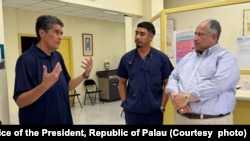Critical funds to counter China in the Pacific are finally on their way to three U.S. allies: Palau, Micronesia and the Marshall Islands.
On Friday, the Senate passed a funding package that provides $7 billion over 20 years for the Compacts of Free Association (COFA) as part of a partial government funding bill. It was signed into law by President Joe Biden over the weekend.
“Extending Compact-related assistance is a critical component of the administration’s Pacific Partnership, Indo-Pacific, and National Security Strategies,” said U.S. Secretary of State Antony Blinken in a statement. “We look forward to working with our partners in the Freely Associated States over the next two decades of COFA-related cooperation.”
The compacts are agreements that give the U.S. strategic access to these regions of the Pacific Ocean. In return, the U.S. provides grants to fund education, health care and infrastructure in these nations, whose citizens are then entitled to study, work and live in the U.S. without a visa.
The United States has had compact agreements in effect with Micronesia and the Marshalls since 1986 and with Palau since 1994.
The compacts' renewals were signed last year but funding stalled as U.S. lawmakers struggled to reach agreement on full-year spending. Palau has been forced to borrow to pay for basic government services like education and health care while waiting for $890 million — its share of the funds.
“It’s not Oct. 1, but it’s at least within this fiscal year, and really just in time,” Palau President Surangel Whipps Jr. told VOA in an interview on Monday.
“[This] allows us to stop borrowing to keep government operations going; it allows us to hire those critical police officers, health care workers and education teachers that we need,” he said.
Palau’s economy tanked after Chinese tourism dropped by more than 50% in the wake of the COVID pandemic. The island nation maintains diplomatic relations with Taiwan under repeated pressure from Beijing to switch alliances.
Whipps says he recently met with investors from Singapore and Japan, as well as United Airlines with a request for direct service to Japan. He said now that COFA is funded, he can promise a stable and secure environment to financiers.
“[It’s important that we’re] opening up new markets so that we're diversified and more resilient, not so dependent on the Chinese tourism, which could be weaponized,” said Whipps.
Coordinated push
The final passage comes after a coordinated pressure campaign, from members of Congress as well as the Pacific region.
“The COFA agreements send a clear message of U.S. commitment to the Pacific region and take a much-needed international strong stand for the ideals of democracy and freedom,” American Samoa Representative Aumua Amata Coleman Radewagen said in a statement after the House passed COFA on Wednesday.
“I’ve appreciated the partnership of my colleagues on both sides of the aisle and thank the many advocates -- in Hawaii and in COFA communities across the country -- whose hard work made this victory possible,” Hawaii Senator Mazie Hirono said in a statement after the Senate passed COFA, Friday.
The leaders of Micronesia and the Marshall Islands joined Whipps in February in drafting a letter to congressional leaders warning of the consequences of not funding the compacts.
Like Palau, the Marshall Islands maintains diplomatic relations with Taiwan, while Micronesia has diplomatic relations with Beijing.
“There have been ‘carrot and stick’ efforts from the PRC [People’s Republic of China] to shift our alliances, including discontinuing support of Taiwan,” Marshall Islands President Hilda Heine wrote in the February letter.
At a Nuclear Remembrance Day ceremony in the Marshall Islands on March 1, President Heine said the funding delay had created doubt.
“At some point, our nation needs to seriously consider other options available to us if the U.S. is unable or unwilling to keep its commitments to us. Our nation has been a steadfast ally of the United States, but that should not be taken for granted,” she told the audience.
Delay sends signal
Experts say Washington’s funding delay sent a signal to the rest of the Pacific that undermines U.S. credibility.
“They see our agreements with these three Pacific nations as the bellwether for our entire engagement with the region,” Kathryn Hendel Paik, Center for Strategic and International Studies senior fellow, said Monday in an interview with VOA.
“Our waffling on this has really made them question a relationship that they were already starting to be skeptical on because, historically, we have not always been there for the Pacific and we’ve not always showed up the way we should have,” she said.
Charles Paul, Marshall Islands ambassador to the U.S., told VOA via Zoom on Monday, “We’re looking forward to having the compacts approved.”
He added that the agreement includes about $700 million to address the health impacts of radiation introduced in the 67 American atmospheric nuclear tests between 1946 and 1958.
In a 13-minute video posted Saturday on Facebook, Wesley Sinima, president of the Federated States of Micronesia, said the funding delay stirred up “doubt and uncertainty.” He added, however, that the final agreement will “contribute to greater peace and prosperity” for the Micronesian people and “greater security and stability for the Indo-Pacific region and the world.”
As for Palau, President Whipps said he’s been invited to Washington in the coming weeks for an exchange of diplomatic notes to finalize the compacts. He hopes to attend.





